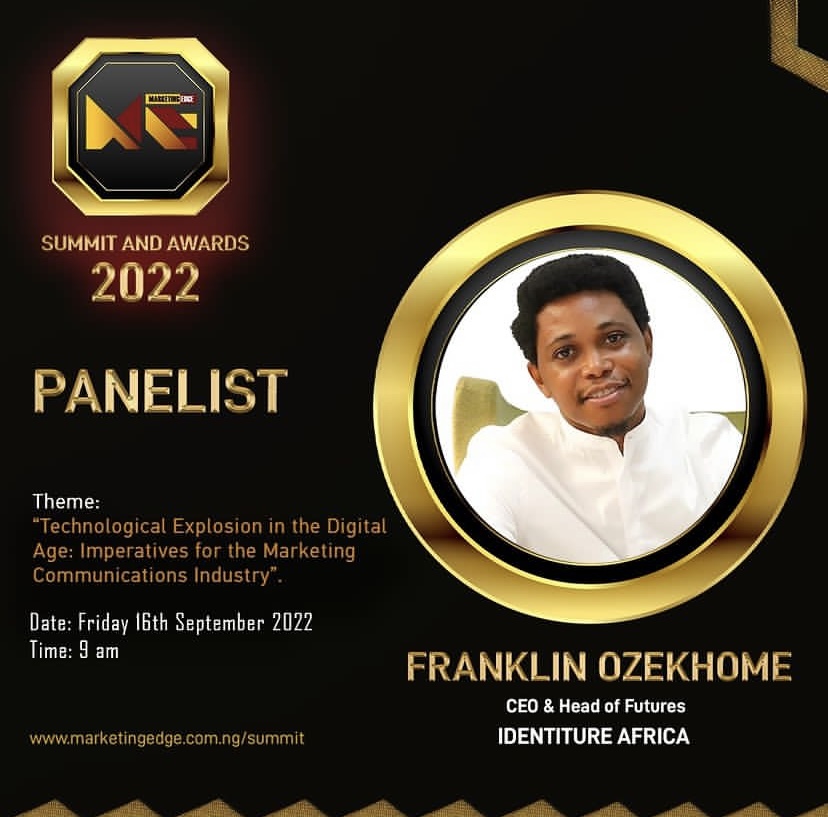By Zion Rufus
Largely due to digital transformation and “changing” times, the Nigerian advertising industry which is currently permeated with inconsistent methodologies and processes, talent drain, high aversion to risks, amalgamation of acquisitions, as well as rinse and repeat hirings from across the industry, is now required to adopt more comprehensive and better integrated models.
“It’s time to rethink the premise on which the advertising industry is built,” Frankline Ozekhome said while buttressing the need to bring the uberification of marketing communications to agencies, a pressing need informed by the increasing migration of IMC industry experts to the tech space.
According to the trends expert who spoke at the recently concluded MARKETING EDGE Annual Stakeholders’ Summit, the world has shifted to a time when agencies need to transform as a platform, not only sharing services when they get a brief, but also using the data, insights, and resources to inform themselves.
“Firstly, there is a very important need to change our business model. Today’s agency structure needs to lead with data-led trends, consumer insights that are contextualised with nuanced meanings, and cultural inspiration sessions.”
He continued: “Secondly, we all can’t be “fully integrated marketing communication agencies” when we do not deep-dive enough into any of the disciplines that accord us respect – from account management to strategic planning, and from creative marketing to campaign implementation. There is room for specialisation across industries so we begin to groom subject matter experts. A good case in point is in the food and beverage industry. If we have agencies specialising in food retail and food services, it’s easier to design an operating system that is unique to how the agency wants to operate for clients, as well as determine its compensation and remuneration policies. By deep-diving into the food services space, for example, professionalism comes into play as the agency team begins to provide both upstream and downstream services – business intelligence, marketing consultancy, brand strategy, industry reports, live events, and communications. And, thirdly, let’s bring the uberification model to marketing and advertising services. That’s how we transform, lead change and growth, as well as harness technology to digitalise our services and put into place a 24 hour mechanism that connects the agency to clients, and clients to consumers.”
The traditional agency model does not allow for real-time discovery (trends and insights), always-on engagement (communications) across platforms, sales and conversion routes (creative commerce), and monitoring and control (evaluation). Marketers are losing sleep searching for newer ways of circumnavigating this seemingly endless loop of ideation to development to management and execution. They want to be able to respond real-time to trends and consumerism, as well as to better connect and engage with consumers. If agencies were to borrow the design thinking mindset of startups that focus on product development, prototyping, testing, iteration and launch to market at speed, then we become better prepared to developing creative marketing solutions that actually resolve mitigating problems beyond brand awareness, perception and conversations, Ozekhome had shared in an earlier submission.
Sticking to this traditional model has amongst other things, prompted some brands to start building in-house agencies.
He advised: “We have to move beyond the way the businesses are currently doing. If you look at the trends in top marketing-centric ompanies and I’m talking about marketing driven companies, not only focused on marketing communications, they are beginning to have their own brand management and creative communication departments where they hire the best of resources from advertising agencies and equip them to design, develop, launch and market their own products and services. The onus is on us to have a rethink of our agency model by asking: “What business are we really in?”






Comment
No comments found.